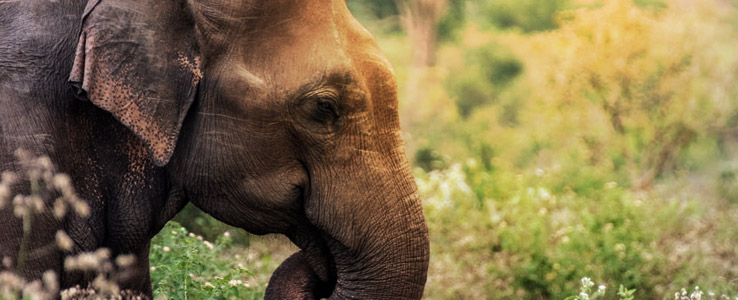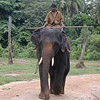
In the lush landscapes of Sri Lanka, amidst the vibrant tapestry of culture and biodiversity, roams an emblem of strength, wisdom, and resilience—the Sri Lankan elephant. Revered as a national symbol and cherished for centuries in religious ceremonies and traditional art, these gentle giants command both awe and respect. Yet, their existence is increasingly threatened by the encroachment of human development into their habitats, leading to a delicate balance between conservation efforts and cultural reverence.
 Cultural Iconography and Significance
Cultural Iconography and SignificanceFor generations, elephants have been woven into the fabric of Sri Lankan culture, symbolizing prosperity, wisdom, and sacred power. From the majestic processions of the Esala Perahera festival to the intricate carvings adorning ancient temples, their presence is omnipresent, reflecting a deep spiritual connection that transcends time.
 Ecological Stewards of the Land
Ecological Stewards of the LandBeyond their cultural symbolism, elephants serve as indispensable ecological stewards, shaping the landscapes they inhabit. As they traverse forests and grasslands, they disperse seeds, create pathways, and sculpt water sources, nurturing the rich biodiversity that thrives in their wake. Their role as keystone species is paramount, influencing the dynamics of entire ecosystems.
 Navigating Human-Elephant Conflict
Navigating Human-Elephant ConflictYet, the harmonious coexistence between humans and elephants is increasingly threatened by the pressures of modernity. Rapid urbanization and agricultural expansion encroach upon elephant habitats, triggering frequent and often deadly encounters between humans and pachyderms. The resulting human-elephant conflict exacts a toll on both sides, jeopardizing lives and livelihoods.
 Conservation Imperatives
Conservation ImperativesIn response, Sri Lanka has embarked on a multifaceted approach to conservation, blending scientific research with community engagement and policy interventions. Protected areas such as Udawalawe and Minneriya offer sanctuaries for elephants, while innovative initiatives promote sustainable land use practices and foster dialogue between stakeholders. Through these efforts, the aim is not only to safeguard elephant populations but also to foster a deeper understanding of their ecological importance.
 Balancing Tourism and Conservation
Balancing Tourism and ConservationTourism, too, plays a pivotal role in the narrative of elephant conservation in Sri Lanka. Wildlife enthusiasts from around the globe flock to national parks and reserves in hopes of catching a glimpse of these majestic creatures in their natural habitat. However, the influx of visitors brings its own set of challenges, necessitating responsible tourism practices that minimize disturbance and prioritize the well-being of both elephants and local communities.
 Looking Ahead: A Shared Future
Looking Ahead: A Shared FutureAs Sri Lanka charts its course towards a sustainable future, the fate of its elephants remains intertwined with the aspirations of its people. Balancing the preservation of cultural heritage with the imperatives of conservation requires a delicate dance—one that acknowledges the intrinsic value of these magnificent creatures while honoring the traditions that bind them to the fabric of Sri Lankan society. In this shared journey, the gentle giants of Sri Lanka stand not only as symbols of strength but also as ambassadors for harmony between humanity and the natural world.
 Pinnawela Elephant Orphanage
Pinnawela Elephant Orphanage
 Life Style of Elephants
Life Style of Elephants
 Elephants and Festivals
Elephants and Festivals
 Elephant Sanctuaryes
Elephant Sanctuaryes